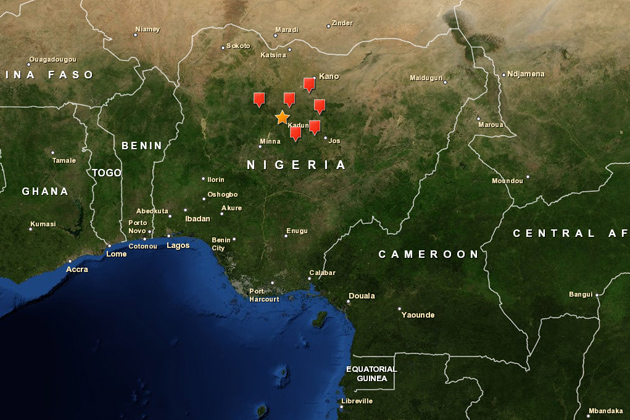
Generally, the students who enroll in geospatial training programs at UConn’s Center for Land Use Education and Research are municipal land use officials from one of Connecticut’s 169 cities and towns. But not always.
When Cary Chadwick received an email from an epidemiologist in the biological sciences department at the Nigerian Defense Academy – an institution similar to West Point – inquiring about enrolling in a basic Geographic Information Systems (GIS) class, she was skeptical.
“After getting over my surprise,” says Chadwick, the Geospatial Training Program Coordinator at the Middlesex County Department of Extension office, “I wrote back thanking Professor Umar for his interest, but then I suggested that GIS training was probably available closer to home … at least somewhere on the continent of Africa!”
But Yahaya Umar and Dominic Maikaje, both professors at the Defense Academy, had been evaluating training programs online and they were certain that it would be worth traveling 5,200 miles from Kaduna, Nigeria to Haddam, Conn. to become better acquainted with GIS technology.

GIS enables users to visualize data in ways that reveal spatial relationships, patterns, and trends, and the two scientists felt the training program offered by UConn would be invaluable as they developed methods of containing various zoonotic diseases (diseases transmitted from animals to people) in their home country.
Maikaje, a specialist in protozoology, and Umar, who specializes in molecular parasitology, are conducting epidemiological studies on the incidence of trypanosomiasis, a parasitic disease more commonly known as ‘sleeping sickness’ that affects both animals and humans, and liver fluke, a parasite carried by snails that live in fresh water supplies frequented by cattle and other animals.
“I know it sounds a little unusual, but we truly felt that this course was the one that best suited our needs,” said Umar.
“And we were right,” added Maikaje. “We are both eager to return to Nigeria and use our new skills. We are very grateful to Cary [Chadwick] and [geospatial educator] Emily Wilson, who have spent a lot of extra time working with us and helping us with our data during our stay here.
“One of the things we will be able to take back home with us is an ability to get a true picture of where disease exists now, and where it is likely to be found tomorrow,” Maikaje continued. “We don’t want to sit and watch these zoonotic diseases continue to ravage both human and animal populations. With the training we have received we will be able to devise methods of containment that will, we hope, eventually lead to eradication of some of these diseases.”
While Umar and Maikaje are appreciative of the technical training they received, they are just as positive about the working relationships they have developed at CLEAR. “We weren’t surprised by the level of training we received,” says Umar “but we were very pleasantly surprised at how quickly we found ourselves sharing knowledge and sharing friendship with everyone, including all the people that we met at CLEAR.”
Added Maikaje, “What we discovered was an atmosphere completely conducive to effective research. When people are open to sharing and willing to help each other, it makes for a rewarding academic environment. And that’s exactly what we found here. We are terribly impressed.”
For her part, Chadwick noted that it was, “a humbling experience to see how this technology can be used in such important applications that are totally different than what we are used to here in Connecticut.”
Chet Arnold, director for outreach at CLEAR, notes that even though the request from Nigeria was unusual, in the past five years Chadwick and Wilson have trained more than 1,000 individuals in the use of GIS, GPS, online mapping, and other geospatial technologies at the Extension office in Haddam. In addition, they have been conducting courses in online mapping techniques for researchers and extension specialists in the Land Grant and Sea Grant university systems around the country, as part of a four-year grant funded by the USDA.
“This was a good experience for everyone,” he says, “We’re really looking forward to hearing about the results of [Umar and Maikaje’s] work when they return to Nigeria.
“And the next time we receive an email from some distant place,” he adds, “I think we’ll be pretty quick to answer.”


